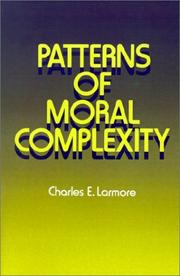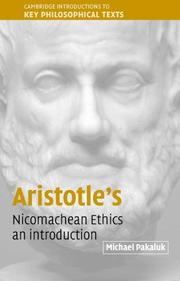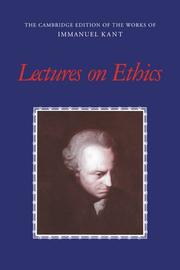| Listing 1 - 10 of 34 | << page >> |
Sort by
|
Multi
ISBN: 2872124128 Year: 2003 Publisher: Bruxelles Fondation Roi Baudouin
Abstract | Keywords | Export | Availability | Bookmark
 Loading...
Loading...Choose an application
- Reference Manager
- EndNote
- RefWorks (Direct export to RefWorks)
Multi
ISBN: 9789819904327 9789819904310 9789819904334 9789819904341 Year: 2023 Publisher: Singapore Springer Nature
Abstract | Keywords | Export | Availability | Bookmark
 Loading...
Loading...Choose an application
- Reference Manager
- EndNote
- RefWorks (Direct export to RefWorks)
This book contributes toward the understanding of the human experience at work during the pandemic and its implications on employee well-being in the context of Malaysia, a developing economy with its own set of unique challenges. Very little research has been done about this issue to date, particularly in Malaysia. This book aims to bridge this gap by examining the Malaysian perspective of the concept of employee well-being in detail with the overarching goal of serving as a guide toward overcoming the challenges wrought on by the ever-changing post-pandemic environment. Different conditions and experiences are discussed to contextualize the unique ways in which individuals react to difficulties with an emphasis on how organizations can assist at a micro-level to allow employees to overcome such difficulties.
Social law. Labour law --- personeelsmanagement --- welzijn --- Employee morale.
Multi
ISBN: 9781316618103 9781107167735 1107167736 1316618102 9781316711835 1316731480 1316733416 1316711838 Year: 2017 Publisher: Cambridge Cambridge University Press
Abstract | Keywords | Export | Availability | Bookmark
 Loading...
Loading...Choose an application
- Reference Manager
- EndNote
- RefWorks (Direct export to RefWorks)
This book fundamentally revises our notion of why soldiers of the eighteenth century enlisted, served and fought. In contrast to traditional views of the brutal conditions supposedly prevailing in old-regime armies, Ilya Berkovich reveals that soldiers did not regard military discipline as illegitimate or unnecessarily cruel, nor did they perceive themselves as submissive military automatons. Instead he shows how these men embraced a unique corporate identity based on military professionalism, forceful masculinity and hostility toward civilians. These values fostered the notion of individual and collective soldierly honour which helped to create the bonding effect which contributed toward greater combat cohesion. Utilising research on military psychology and combat theory, and employing the letters, diaries and memoirs of around 250 private soldiers and non-commissioned officers from over a dozen different European armies, Motivation in War transforms our understanding of life of the common soldier in early modern Europe.
Polemology --- History of Europe --- anno 1700-1799 --- Alltag. --- Erfahrung. --- Identität. --- Militarismus. --- Military morale --- Military morale. --- Männlichkeit. --- Sociology, Military --- Sociology, Military. --- Soldat. --- Soldiers --- Soldiers. --- History --- Europa. --- 1700-1799. --- Europe --- Europe. --- History, Military --- Military sociology --- Armed Forces --- Armies --- Peace --- War --- War and society --- Armed Forces personnel --- Members of the Armed Forces --- Military personnel --- Military service members --- Service members --- Servicemen, Military --- Troop morale --- Morale --- Psychology, Military
Digital
Year: 1838 Publisher: Amsterdam S. de la Chaux
Abstract | Keywords | Export | Availability | Bookmark
 Loading...
Loading...Choose an application
- Reference Manager
- EndNote
- RefWorks (Direct export to RefWorks)

ISBN: 0521338913 0521330343 0511625103 9780521338912 9780511625107 9780521330343 Year: 1987 Publisher: Cambridge: Cambridge university press,
Abstract | Keywords | Export | Availability | Bookmark
 Loading...
Loading...Choose an application
- Reference Manager
- EndNote
- RefWorks (Direct export to RefWorks)
Larmore aims to recover three forms of moral complexity that have often been neglected by moral and political philosophers. First, he argues that virtue is not simply the conscientious adherence to principle. Rather, the exercise of virtue apply. He argues - and this is the second pattern of complexity - that recognizing the value of constitutive ties with shared forms of life does not undermine the liberal ideal of political neutrality toward differing ideals of the good life. Finally Larmore agrues for what he calls the heterogeneity of morality. Moral thinking need not be exclusively deontological or consequentialist, and we should recognize that the ultimate sources of moral value are diverse. The arguments presented here do not attack the possibility of moral theory. But in addressing some of the central issues of moral and political thinking today thay attempt to restore to that thinking greater flexibility and a necessary sensitivity to our common experience.
Ethics. --- --Philosophie morale --- --Philosophie politique --- Ethics --- Deontology --- Ethics, Primitive --- Ethology --- Moral philosophy --- Morality --- Morals --- Philosophy, Moral --- Science, Moral --- Philosophy --- Values --- General ethics --- Éthique --- --Ethics --- Arts and Humanities --- Philosophie morale --- Philosophie politique
Multi
ISBN: 9780674074569 9780674072770 0674072774 0674074564 0674074580 0674660013 Year: 2013 Publisher: Cambridge ; London : Harvard University Press,
Abstract | Keywords | Export | Availability | Bookmark
 Loading...
Loading...Choose an application
- Reference Manager
- EndNote
- RefWorks (Direct export to RefWorks)
When Rome was at its height, an emperor's male beloved, victim of an untimely death, would be worshipped around the empire as a god. In this same society, the routine sexual exploitation of poor and enslaved women was abetted by public institutions. Four centuries later, a Roman emperor commanded the mutilation of men caught in same-sex affairs, even as he affirmed the moral dignity of women without any civic claim to honor. The gradual transformation of the Roman world from polytheistic to Christian marks one of the most sweeping ideological changes of premodern history. At the center of it all was sex. Exploring sources in literature, philosophy, and art, Kyle Harper examines the rise of Christianity as a turning point in the history of sexuality and helps us see how the roots of modern sexuality are grounded in an ancient religious revolution. While Roman sexual culture was frankly and freely erotic, it was not completely unmoored from constraint. Offending against sexual morality was cause for shame, experienced through social condemnation. The rise of Christianity fundamentally changed the ethics of sexual behavior. In matters of morality, divine judgment transcended that of mere mortals, and shame-a social concept-gave way to the theological notion of sin. This transformed understanding led to Christianity's explicit prohibitions of homosexuality, extramarital love, and prostitution. Most profound, however, was the emergence of the idea of free will in Christian dogma, which made all human action, including sexual behavior, accountable to the spiritual, not the physical, world.
History --- Sex --- Sexual ethics --- Civilization, Classical. --- Religious aspects --- Christianity. --- Rome --- Moral conditions. --- Civilization, Classical --- Christianity --- Ethics, Ancient --- Sexualité --- Morale sexuelle --- Morale ancienne --- Civilisation ancienne --- Histoire --- Aspect religieux --- Christianisme --- Conditions morales --- Sexe --- Éthique sexuelle --- Rome ancienne --- Péché

ISBN: 9780521520683 0521520681 9780521817424 0521817420 9780511802041 0511130724 9780511130724 051112919X 9780511129193 0511802048 9780511561849 0511561849 1107144949 0511643985 9786612394430 1282394436 0511200390 Year: 2005 Volume: *1 Publisher: Cambridge, U.K. ; New York : Cambridge University Press,
Abstract | Keywords | Export | Availability | Bookmark
 Loading...
Loading...Choose an application
- Reference Manager
- EndNote
- RefWorks (Direct export to RefWorks)
This is an engaging and accessible introduction to the Nicomachean Ethics, Aristotle's great masterpiece of moral philosophy. Michael Pakaluk offers a thorough and lucid examination of the entire work, uncovering Aristotle's motivations and basic views while paying careful attention to his arguments. The chapter on friendship captures Aristotle's doctrine with clarity and insight, and Pakaluk gives original and compelling interpretations of the Function Argument, the Doctrine of the Mean, courage and other character virtues, Akrasia, and the two treatments of pleasure. There is also a useful section on how to read an Aristotelian text. This book will be invaluable for all student readers encountering one of the most important and influential works of Western philosophy.
General ethics --- Aristotle --- Ethics, Ancient. --- Morale ancienne --- Aristotle. --- Ethics --- Ethics, Ancient --- Ancient ethics --- Arts and Humanities --- Philosophy --- Aristotle. - Nicomachean ethics.
Multi
ISBN: 9780521604161 9780521843454 0521604168 0521843456 9780511809538 9780511649967 0511649967 9780511409066 0511409060 0511809530 1107175267 0511408250 0511567553 Year: 2008 Publisher: Cambridge, UK ; New York : Cambridge University Press,
Abstract | Keywords | Export | Availability | Bookmark
 Loading...
Loading...Choose an application
- Reference Manager
- EndNote
- RefWorks (Direct export to RefWorks)
Immanuel Kant's Groundwork of the Metaphysics of Morals of 1785 is one of the most profound and important works in the history of practical philosophy. In this introduction to the Groundwork, Sally Sedgwick provides a guide to Kant's text that follows the course of his discussion virtually paragraph by paragraph. Her aim is to convey Kant's ideas and arguments as clearly and simply as possible, without getting lost in scholarly controversies. Her introductory chapter offers a useful overview of Kant's general approach to practical philosophy, and she also explores and clarifies some of the main assumptions which Kant relies on in his Groundwork but defends in his Critique of Pure Reason. The book will be a valuable guide for all who are interested in Kant's practical philosophy.
Kant, Immanuel --- Ethics --- Morale --- Kant, Immanuel, --- Deontology --- Ethics, Primitive --- Ethology --- Moral philosophy --- Morality --- Morals --- Philosophy, Moral --- Science, Moral --- Philosophy --- Values --- Ethics. --- Arts and Humanities

ISBN: 0521560616 0521788048 1107049512 9781107049512 9780521560610 9780521788045 Year: 1997 Volume: *4 Publisher: Cambridge Cambridge University Press
Abstract | Keywords | Export | Availability | Bookmark
 Loading...
Loading...Choose an application
- Reference Manager
- EndNote
- RefWorks (Direct export to RefWorks)
This volume contains four versions of the lecture notes taken by Kant's students of his university courses in ethics given regularly over a period of some thirty years. The notes are very complete and expound not only Kant's views on ethics but many of his opinions on life and human nature. Much of this material has never before been translated into English. As with other volumes in the series, there are copious linguistic and explanatory notes and a glossary of key terms.
Ethics --- Ethiek --- Ethique --- Morale --- Deontology --- Ethics, Primitive --- Ethology --- Moral philosophy --- Morality --- Morals --- Philosophy, Moral --- Science, Moral --- Philosophy --- Values --- General ethics --- Ethics. --- Arts and Humanities
Multi
ISBN: 9780814708279 9780814737484 0814708277 9780814724118 0814724116 Year: 2012 Publisher: New York : New York University Press,
Abstract | Keywords | Export | Availability | Bookmark
 Loading...
Loading...Choose an application
- Reference Manager
- EndNote
- RefWorks (Direct export to RefWorks)
The men who fought in Napoleon’s Grande Armée built a new empire that changed the world. Remarkably, the same men raised arms during the French Revolution for liberté, égalité, and fraternité. In just over a decade, these freedom fighters, who had once struggled to overthrow tyrants, rallied to the side of a man who wanted to dominate Europe. What was behind this drastic change of heart? In this ground-breaking study, Michael J. Hughes shows how Napoleonic military culture shaped the motivation of Napoleon’s soldiers. Relying on extensive archival research and blending cultural and military history, Hughes demonstrates that the Napoleonic regime incorporated elements from both the Old Regime and French Revolutionary military culture to craft a new military culture, characterized by loyalty to both Napoleon and the preservation of French hegemony in Europe. Underscoring this new, hybrid military culture were five sources of motivation: honor, patriotism, a martial and virile masculinity, devotion to Napoleon, and coercion. Forging Napoleon's Grande Armée vividly illustrates how this many-pronged culture gave Napoleon’s soldiers reasons to fight.
History --- Soldiers --- Masculinity --- Military morale --- Sociology, Military --- Napoleonic Wars, 1800-1815. --- Attitudes --- Napoleon --- Military leadership. --- France. --- History. --- Military life. --- France --- History, Military
| Listing 1 - 10 of 34 | << page >> |
Sort by
|

 Search
Search Feedback
Feedback About UniCat
About UniCat  Help
Help News
News